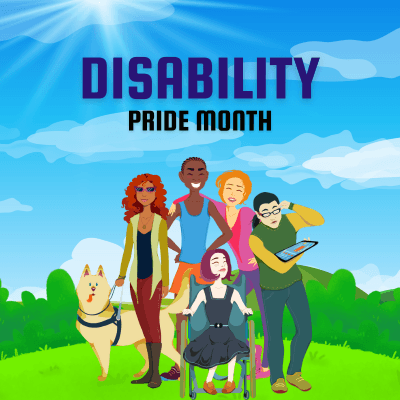
July is Disability Pride Month, a time to celebrate the strength, diversity, and advocacy of the disability community. It’s also a time to reflect on the unique challenges faced by people with disabilities, particularly the disproportionate rates of violence they experience and the systemic barriers they encounter when seeking safety and support.
The Overlap of Disability and Domestic Violence
People with disabilities—both physical and developmental—experience domestic violence, sexual assault, and other forms of abuse at significantly higher rates than people without disabilities. According to the U.S. Department of Justice, individuals with disabilities are nearly four times more likely to experience violent victimization.
This increased risk is not because of disability itself, but rather because of societal barriers, discrimination, and a lack of accessible services and protections.
Some key factors contributing to this disparity include:
- Dependency and Isolation: People with disabilities may rely on caregivers, partners, or family members for daily needs. In abusive situations, this can lead to manipulation, neglect, or control over medication, mobility devices, or communication tools.
- Communication Barriers: Survivors with intellectual, cognitive, or communication disabilities may have difficulty reporting abuse or may not be believed when they do.
- Lack of Accessible Resources: Shelters, crisis lines, counseling, and legal services are not always designed with accessibility in mind—whether that’s physical access for mobility devices, communication access for Deaf survivors, or trauma-informed care for neurodiverse individuals.
- Legal and Institutional Gaps: People with disabilities often encounter challenges navigating the criminal legal system or accessing protective orders, especially when support staff or interpreters are unavailable or untrained in disability accommodations.
Disability Is Not a Barrier to Strength—But Systems Can Be
Disability Pride Month reminds us that disability is a natural part of human diversity. The problem is not the presence of a disability, but rather the systems and attitudes that create obstacles to safety, autonomy, and dignity.
Survivors with disabilities deserve:
- Full autonomy in decision-making
- Accessible, affirming services
- Trusting relationships with advocates who are trained in both disability justice and trauma-informed care
Advocates can take meaningful steps by:
- Asking about access needs early and often
- Using plain language and visual supports in materials
- Partnering with disability-led organizations to enhance services
- Ensuring shelter and outreach services are physically, communicatively, and emotionally accessible
Resources for Survivors and Advocates
Whether you're looking for support, ways to improve your program's accessibility, or opportunities to learn more, here are a few starting points:
For Survivors:
- Disability Rights New York – www.drny.org: Provides advocacy, protection, and legal services for people with disabilities in New York State.
- New York State Domestic Violence 24-Hour Hotline (English & español/Multi-language accessibility): 1-800-942-6906 or 711 for Deaf or Hard of Hearing
- New York State Chat/Text hotline Text at 844-997-2121 Chat: https://opdv.ny.gov/chat.html
- National Domestic Violence Hotline – www.thehotline.org | Call 800-799-7233 or text “START” to 88788. Accessible via TTY and online chat.
- Center for Independence of the Disabled NY – www.cidny.org: Offers peer support, advocacy, and assistance navigating services.
For Advocates and Professionals:
- DeafHope – www.deaf-hope.org: Provides resources for Deaf survivors and training for advocates.
- The Vera Institute’s End Abuse of People with Disabilities Initiative – www.endabusepwd.org: Offers toolkits, webinars, and technical assistance.
- Accessing Safety Initiative Toolkit – www.ncdsv.org: Guidance on building collaborations between disability and domestic violence service providers.


